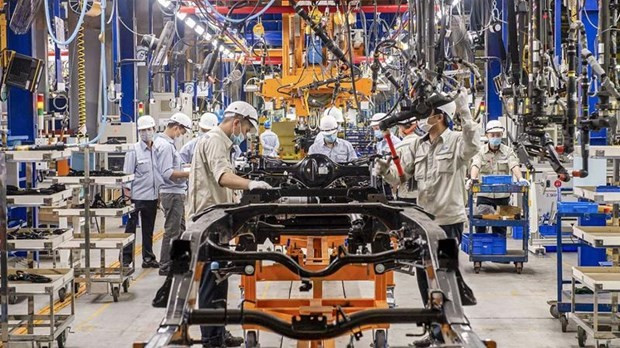S&P Global: Vietnam's manufacturing industry shows signs of stabilisation
Vietnam's manufacturing industry remained in contraction territory in July but showed some signs of stabilisation as softer declines were seen in output, new orders and employment while business confidence picked up, according to S&P Global.
The S&P Global Vietnam Manufacturing Purchasing Managers' Index (PMI), released on August 1, posted 48.7 in July, up from 46.2 in June. The fact that the PMI is still below the benchmark of 50 points reflects that although Vietnam's manufacturing industry has recovered slightly, operating conditions are still deteriorating.
Business confidence picked up to a four-month high in July, but remained relatively muted. Firms hope that an eventual recovery in customer demand will feed through to renewed production growth, but remain concerned by the current challenges in securing new business.
Andrew Harker, Economics Director at S&P Global Market Intelligence, said the Vietnamese manufacturing sector remained under pressure in July with firms again struggling to secure new business and scaling back output accordingly.
Despite the latest drop in production, firms were still left with unsold stock. Meanwhile, prices continue to fall and supplier delivery time is shortened as production capacity in the industry is not fully utilised.
"On a more positive note, there were signs that demand may be stabilising as new orders fell at the softest pace in five months. Firms will be hoping that this may feed through to renewed growth of orders in the months ahead,” he said.
According to S&P Global, the trend in the headline index was matched by a number of the survey's sub-indices in July, with rates of contraction in output, new orders and employment either the weakest or joint-weakest in the respective sequences of reduction which stretch back to March in all cases. In particular, new orders decreased marginally in July amid some signs of stabilising demand.
However, manufacturers signaled that demand remained subdued overall, particularly in export markets. Some companies said the number of new orders from European customers decreased.
With new orders still declining, firms scaled back production again in July, although the problem of power shortages that occurred in June no longer contributed to the pace of contraction since the previous survey period.
Lower new orders meant that backlogs of work continued to fall in July, with the rate of depletion accelerating from that seen in June. Meanwhile, there were signs that the demand weakness across the sector contributed to an unwanted build-up of inventory holdings.
Stocks of finished goods rose for the first time in three months amid difficulties selling products, while stocks of inputs accumulated for the first time in the year-to-date as production was scaled back.
A lack of demand for inputs was the key factor behind a reduction in suppliers' delivery time, while there were continued reports of reduced shipping disruption helping to speed up deliveries.






